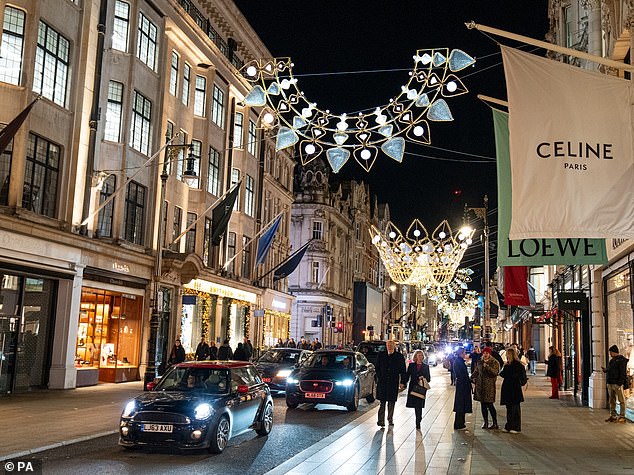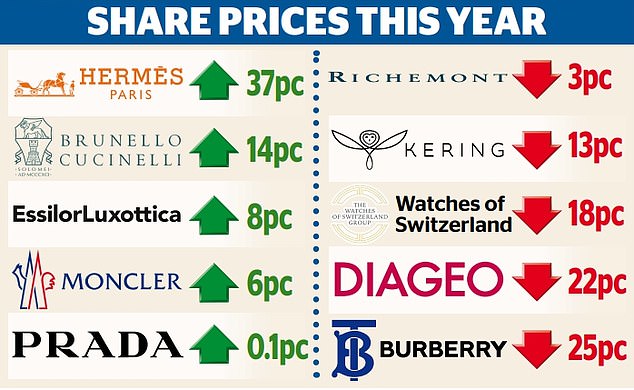Bond Street, London’s ritziest retail thoroughfare, is putting on a dazzling show this Christmas.
The glossy boutiques of the luxury brands are decked out with the most eye-catching of decorations. The exuberance of the displays is at variance however, with the downbeat sentiment surrounding the stocks in these businesses.
The post-pandemic urge to splash lockdown savings on expensive bags, clothing, jewellery and spirits has slackened amid cost of living pressures. In America and China, the slowdown has been particularly marked.
For a period, LVMH, the sector’s £330billion titan, seemed almost unassailable, thanks to the allure of Sephora, Tiffany, TAG Heuer and its other ‘houses’.
But, in a shock advance last month, Edouard Aubin, the influential Morgan Stanley analyst, downgraded his target price for shares in LVMH from €860 (around £740) to €790 (which is almost £680), citing subsiding demand for LVMH wares. These include the £2,240 Loop Boho Louis Vuitton bag.

Best foot forward: Bond Street, London’s ritziest retail thoroughfare, is putting on a dazzling show this Christmas
Walking down Bond Street, I paused to admire the merchandise in the glittering windows of Burberry, whose shares are down 28 per cent since January. I also took a look at the fashions in Gucci, a division of the Kering empire, whose price has fallen by 17 per cent.
The jewellery at Cartier, sported by singer Taylor Swift and actor Timothee Chalamet, was another reason to linger. Cartier is one of the baubles in Richemont, the Swiss conglomerate.
Have its shares tumbled? Yes, by 11 per cent, regardless of these starry associations. These declines led me to start planning how to divert my acquisitive urges towards luxury goods stocks, betting that these names have the creativity and clout to overcome their travails.
Claudia D’Arpizio and Federica Levato of the Bain consultancy remain sanguine, forecasting that global luxury goods sales will hit a record £311billion ‘despite short-term uncertainties’.
In the autumn, LVMH chief executive Bernard Arnault began buying the company’s shares in the wake of disappointing second-quarter figures. In the spring, Arnault was briefly the world’s richest man, suggesting a level of investing acumen.
Goldman Sachs analyst Louise Singlehurst rates LVMH a ‘buy’ with a target price of €950 (£816). Arnault’s confidence in the outlook may rely on such estimates.
It may also be based on the view that consumers have not lost their penchant for premium products, but are, instead, making different choices. The crisis in China’s property market has caused its billionaires to economise – slightly – on cognac.
Swetha Ramachandran, manager of the Artemis Leading Consumer Brands fund, says: ‘They used to drink the $3,000-a-bottle Remy Cointreau cognacs. They’ve not stopped having brandy, but they’re downgrading to the slightly less costly versions.’
By contrast, some among the well-heeled are buying less, but buying better, in a flight to quality that explains why the S&P Global Luxury Index is 8.7 per cent higher than at the start of the year. Some luxury stocks have not lost their lustre. Take, for example, Brunello Cucinelli, celebrated for its £940 cashmere jumpers. Shares in this Italian company have risen by 13 per cent since January. Also up – by 32 per cent – is Hermes, the 186-year old maker of the status symbol Birkin and Kelly handbags.
Ramachandran says that Hermes has pricing and staying power which form a defensive moat against upstart rivals, essential attributes for inclusion in the fund. She expects the road ahead to be bumpy, but adds: ‘The long-term runway for growth is strong.’

Her optimism is based on the expanding numbers of affluent consumers in Asia, where five people unite the middle-class every second.
You may not be persuaded that America and China will, within a reasonable space of time, regain its taste for £47,000 TAG Heuer Carrera watches. But your fortunes will be staked on the fate on some of these companies if you have money in various popular funds.
Burberry is a holding at Lindsell Train UK Equity and Finsbury Income & Growth. Fundsmith holds LVMH and L’Oreal whose luxe beauty lines include Yves Saint Laurent. Meanwhile Smithson has a stake in Moncler, whose padded jackets are worn by singer Dua Lipa.
I am an investor in both Fundsmith and Smithson. But on my Christmas list is the Amundi S&P Global Luxury exchange traded fund (ETF), and in the new year I will be looking for more weakness in Kering, LVMH, Richemont and the rest.
I admire glamorous accessories, but I also want the value of my portfolio to appreciate admire a fine brandy.
Some links in this article may be affiliate links. If you click on them we may earn a small commission. That helps us fund This Is Money, and keep it free to use. We do not write articles to advocate products. We do not allow any commercial relationship to affect our editorial independence.



